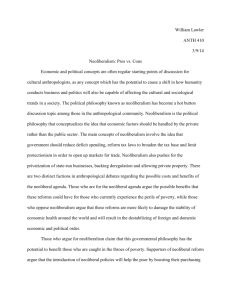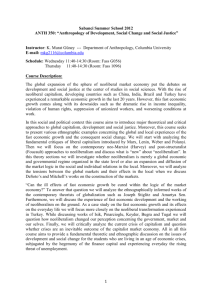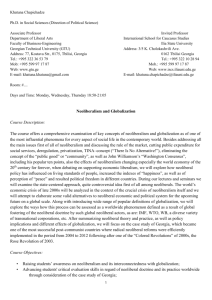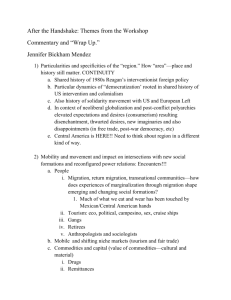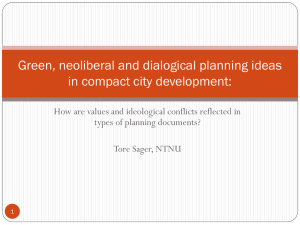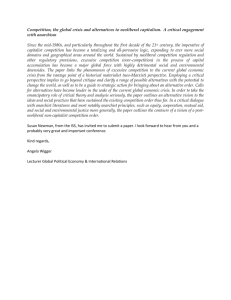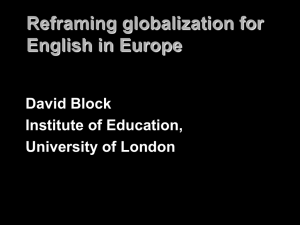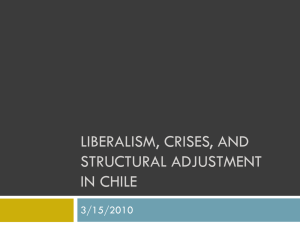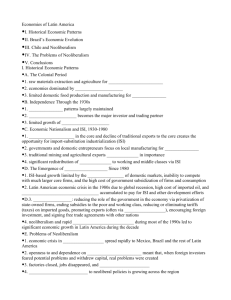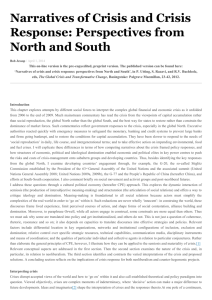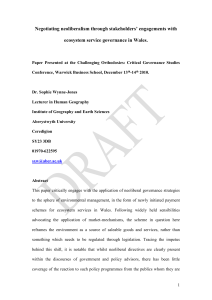Published in Our Schools/Our Selves, Summer 2014, 24(4). The
advertisement
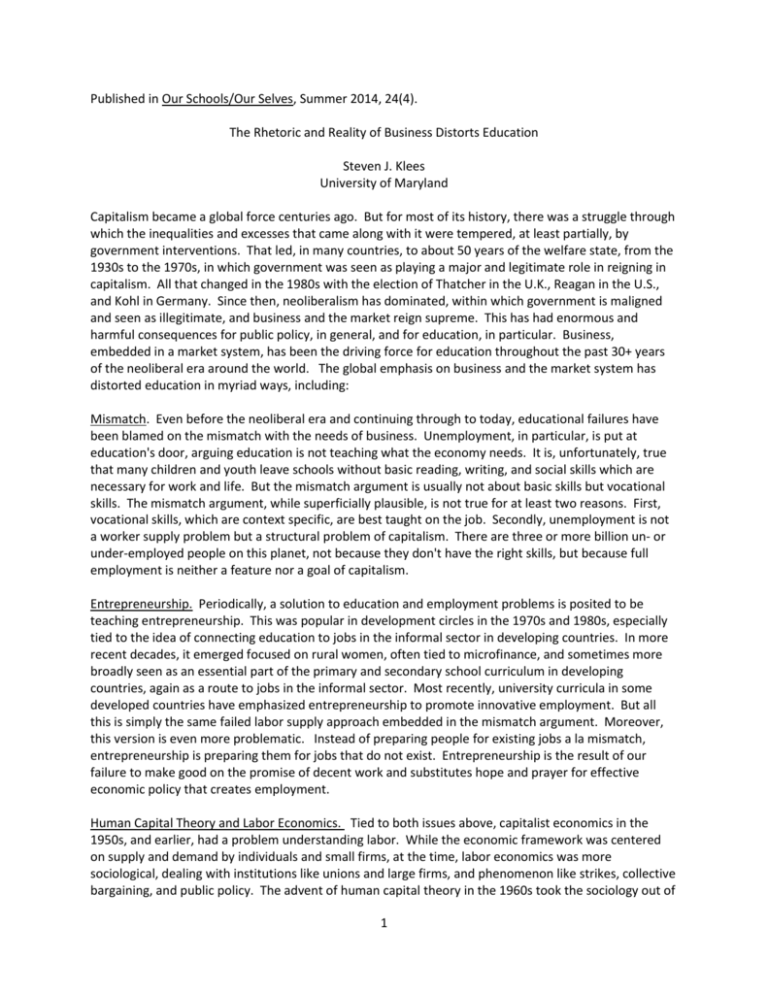
Published in Our Schools/Our Selves, Summer 2014, 24(4). The Rhetoric and Reality of Business Distorts Education Steven J. Klees University of Maryland Capitalism became a global force centuries ago. But for most of its history, there was a struggle through which the inequalities and excesses that came along with it were tempered, at least partially, by government interventions. That led, in many countries, to about 50 years of the welfare state, from the 1930s to the 1970s, in which government was seen as playing a major and legitimate role in reigning in capitalism. All that changed in the 1980s with the election of Thatcher in the U.K., Reagan in the U.S., and Kohl in Germany. Since then, neoliberalism has dominated, within which government is maligned and seen as illegitimate, and business and the market reign supreme. This has had enormous and harmful consequences for public policy, in general, and for education, in particular. Business, embedded in a market system, has been the driving force for education throughout the past 30+ years of the neoliberal era around the world. The global emphasis on business and the market system has distorted education in myriad ways, including: Mismatch. Even before the neoliberal era and continuing through to today, educational failures have been blamed on the mismatch with the needs of business. Unemployment, in particular, is put at education's door, arguing education is not teaching what the economy needs. It is, unfortunately, true that many children and youth leave schools without basic reading, writing, and social skills which are necessary for work and life. But the mismatch argument is usually not about basic skills but vocational skills. The mismatch argument, while superficially plausible, is not true for at least two reasons. First, vocational skills, which are context specific, are best taught on the job. Secondly, unemployment is not a worker supply problem but a structural problem of capitalism. There are three or more billion un- or under-employed people on this planet, not because they don't have the right skills, but because full employment is neither a feature nor a goal of capitalism. Entrepreneurship. Periodically, a solution to education and employment problems is posited to be teaching entrepreneurship. This was popular in development circles in the 1970s and 1980s, especially tied to the idea of connecting education to jobs in the informal sector in developing countries. In more recent decades, it emerged focused on rural women, often tied to microfinance, and sometimes more broadly seen as an essential part of the primary and secondary school curriculum in developing countries, again as a route to jobs in the informal sector. Most recently, university curricula in some developed countries have emphasized entrepreneurship to promote innovative employment. But all this is simply the same failed labor supply approach embedded in the mismatch argument. Moreover, this version is even more problematic. Instead of preparing people for existing jobs a la mismatch, entrepreneurship is preparing them for jobs that do not exist. Entrepreneurship is the result of our failure to make good on the promise of decent work and substitutes hope and prayer for effective economic policy that creates employment. Human Capital Theory and Labor Economics. Tied to both issues above, capitalist economics in the 1950s, and earlier, had a problem understanding labor. While the economic framework was centered on supply and demand by individuals and small firms, at the time, labor economics was more sociological, dealing with institutions like unions and large firms, and phenomenon like strikes, collective bargaining, and public policy. The advent of human capital theory in the 1960s took the sociology out of 1 labor economics and focused it on individuals and the supply of and the demand for workers, mostly on supply. Education was seen as investment in individual qualities that made one more productive and employable. This was operationalized by measuring rates of return (RORs) to different levels or types of education. Unfortunately, these RORs had no legitimacy for two reasons. First, in theory, they should have been looking at much more than the impact on income, and, since they did not, the results were distorted. Second, they could not even accurately measure the impact of education on income since income is affected by dozens of variables and there is no correct way to control for them. While ROR measures were a form of voodoo economics, nonetheless, in the abstract, there is some truth to this supply version of human capital theory. However, that truth is partial at best, and actually more empty than useful. That is, abilities like literacy, numeracy, teamwork, problem-solving, critical thinking, etc. can have a payoff in the job market but only in a context where such skills are valued. The more useful and important question is the demand-side one, too often ignored by human capital theorists, regarding how can we create decent jobs that require valuable skills. Under neoliberalism, government intervention, at best, furthers human capital formation. Government intervention for other purposes, like decent job creation, is considered anathema under neoliberalism; the market is supposed to take care of the demand side. We have seen how spectacularly unsuccessful reliance on the market has been for creating decent employment. Education and Economic Growth. Tied to the human capital argument that education yields individual income and jobs is a related, broader argument that education and other forms of human capital yield overall economic growth, thus providing some aggregate benefits to society. Unfortunately, this has also not proven to be a fruitful line of empirical inquiry. The death knell for this research was sounded early, in 1970, when Mark Blaug, perhaps the preeminent economist of education, showed how absurd were empirical forays into the question. The basic problem is that GNP is the result of literally hundreds of variables, and our research methodologies have no way of controlling accurately for all of them in order to isolate the effect of one variable, like years of schooling. It is not that you can't get empirical estimates. You can, they are just not believable. Over the years, since Blaug's analysis, a few economists have attempted to estimate the effects of education on GNP. Two foolhardy souls actually estimated the effect of one more textbook available or one additional student in a class, supposedly tracing through the consequences of those factors until their impact on GNP. But the idea that such a tenuous connection can be estimated empirically is simply unbelievable. However, most recently, two intrepid economists, Erick Hanushek and Ludger Woessman, published a few studies purporting that Blaug was wrong and that we can empirically measure the effect of years of schooling, and moreover the quality of that schooling, as measured by test scores, on GNP. Well, for me, this is as farfetched as the textbook and class size example for the reasons above -- but it seems like many people are unreflectively accepting this tenuous chain of reasoning. It has become commonplace to argue something like a 1% increase in education quality will get you a 1.3% increase in GDP. This is simply absurd. And the upshot is that these economic/business/market arguments further distort education and education policy. They continue to privilege a narrow discourse about education and the economy, they are used to market very narrow approaches to and measures of educational quality, and they undermine other discourses which take more sensible and legitimate approaches to making educational policy such as ones based on human rights and participatory democracy. Direct Investment. Business does not only influence educational discourses, as discussed above. Education itself has become big business. It is estimated that the private market for education is worth 2 at least $50 billion worldwide. Private schooling continues to be a significant part of primary and secondary schooling around the world and, in the neoliberal era, an ever more significant part of postsecondary education. Organizations like the International Finance Corporation (IFC), part of the World Bank Group, while created in 1956 to invest in private companies in developing countries, grew precipitously in the neoliberal era. Education was initially a small area of investment but has grown to where the IFC in 2012 has over $850 million in commitments. Direct foreign investment in education has also been promoted by the World Trade Organization's (WTO) General Agreement on Trade in Services (GATS). GATS encourages countries to open their economies to foreign investment in education (and other services), raising questions of accountability, control, and sovereignty. Privatization. Direct private investment in education did not begin under neoliberalism but was greatly facilitated by it. As said above, neoliberalism brought an ideology that deprecated government and exalted the private sector. The privatization of public services was encouraged and, in education, private schools, vouchers, charters, user fees, and the like were recommended as solutions to problems of educational quality and even educational inequality. This marketing of privatization was pure ideology. There was only trumped-up evidence that these approaches improved some narrow version of educational quality and there was overwhelming evidence that they exacerbated inequalities. Moreover, the recognition of education as a public good, that had been so strong in the 1960s and 1970s, got short shrift in discussions of education policy after that. Privatization is a strategy of triage – perhaps, at best, sometimes improving education for a few and selling out the right to quality public education for all. Public-Private Partnerships (PPPs). An outgrowth of this neoliberal obsession with the market and its promotion of privatization are PPPs, which come along with a belief in the need for increased corporate philanthropy in education and other sectors. The argument is that the know-how and resources of business, on its own or in partnership with government, can be applied to improving education. This follows directly from neoliberal ideology, made more salient by the vast shortfall of public resources to achieve EFA and the MDGs. However, business has little to offer education as a recent Brookings Institution study of U.S. corporate philanthropy and PPPs made clear; the resources offered were "small change," and efforts were self-interested, uncoordinated, small in scale, and misdirected. I had a business school professor who once wrote a paper entitled, "The Social Responsibility of Business and Other Pollutants of the Air." He was very pro-business; his point was that the business of business was business, and we shouldn't want or expect them to help solve problems that are fundamentally government's. PPPs are pushed by companies like Pearson who stand to make substantial profits off government expenditures on education. PPPs exist mostly because of neoliberalism’s abrogation of responsibility by government for the social welfare, in general, and education, in particular. Business Approaches to Education. As part of privatization ideology and the promotion of PPPs, ideas from business and business leaders have been marketed as important to the improvement of education. Sometimes this entire business-oriented approach is subsumed under the heading of “new public management.” This is ubiquitous and has given most educators a lot of headaches. Right-wing think tanks and foundations (I include the World Bank here) have proliferated, offering neoliberal educational advice and steering educational policy. Primary, secondary, and higher education have suffered from the call for business plans, strategic plans, performance budgets, right-sizing, impact evaluation, merit pay, and the like. Evaluations of teachers have multiplied, usually illegitimately tied to a few very narrow indicators. School district superintendants and university presidents are now called chief executive officers, and too often are selected with a business background instead of an education one. And, most common, is that task forces and commissions on education routinely give pride of place to 3 business executives, as if business strategies translate to education strategies. This is quite visible globally, to take one of many examples, in the World Economic Forum's task force on education. They have been a major voice in global education reform such as the post-2015 discussions. Post-2015 Directions. EFA targets and MDGs will not be met in 2015, and there is lots of activity, around the world, examining potential post-2015 directions. Perhaps the most comprehensive and influential is that done by the U.N. appointed High Level Panel (HLP) which sets out 12 goals and 54 measureable targets. Goals such as the elimination of poverty and hunger -- as well as the others -- are laudable, as is the ethos of sustainable development that underlies the whole report. But unfortunately, the report is based on an ideological commitment to a neoliberal context. For example, the report acknowledges that the eradication of poverty has been "promised time and again." But there is no recognition of the causes of the repeated failure to achieve this goal -- causes that are built into our economic system. Poverty is not a failure of our economic system; inequality and poverty are the result of the successful functioning of our economic system. At one point, the report does recognize the need for "structural changes in the world economy," yet, throughout, the HLP report just calls for more of the same. It takes almost a religious fundamentalist view of a market system and a pro-business ethos. It calls for an "enabling business environment." It argues that "business wants, above all, a level playing field," and is willing to pay "fair taxes" and "promote labor rights." What nonsense! No business wants a level playing field. Wasn't it Lee Iacocca, former chair of Chrysler, at the time of his government bailout, who said, "Socialism for me, capitalism for everyone else." Profit-maximizing businesses naturally want any advantage they can get. If they can get away with it. They want to pay no taxes, and many do not pay any. And they certainly do not champion labor rights. The history of capitalism is one of struggle, where business has been dragged kicking and screaming to give concessions to workers. This is not particularly a criticism of business, it is simply a description of its natural state in a market system. Our market system has been eulogized and subsidized for a long time, most especially for the past 30 years, yet inequality, poverty, and unemployment remain rampant. Why would we expect the market system to perform any better between now and 2030? Where are decent jobs supposed to come from? How will "no person be left behind?" The best that the HLP can come up with is the by now shopworn idea of a global partnership. But this is a false partnership; we are not all in this together. We live in a world full of conflicting interests, there are debates that permeate every aspect of policy. The report touches on none of this. Engaging post-2015 goals while neoliberalism operates business as usual will not get us very far. Many would argue that EFA and the MDGs have not gotten us very far. For example, the international community has been promising Universal Primary Education (UPE) for 50 years. And now, unconscionably, it is once again postponing this and other goals, this time to 2030. By the time UPE is reached the payoff to primary education in terms of jobs and access to further schooling will be considerably reduced, and the disadvantage of not having primary education will be replaced by the even bigger disadvantage of not having secondary education. It could be argued that, despite good intentions, EFA and the MDGs were not serious efforts. Instead, they were there to legitimate a fundamentally unfair system by promising education and social improvement but delivering little. We have endured 30+ years of a Great Experiment. With no evidence whatsoever, government was attacked and, in many ways, dismantled, and business and the market were put forth as saviors. However, in education and elsewhere, the results of this Great Experiment have been dismal. It is time 4 to end this experiment with neoliberal capitalism. Whether this means trying to move beyond capitalism entirely or whether it means the development of a new kind of welfare state is worth discussion. What it certainly means is to re-establish the legitimacy of government. What needs to be front and center is the call for a large, vibrant public sector that puts limits on the market, that promotes and creates decent employment, that provides for the production of public goods, that develops an adequate and fair system of taxation, that redistributes wealth, not just income, and that is run as a very participatory democracy. 5

